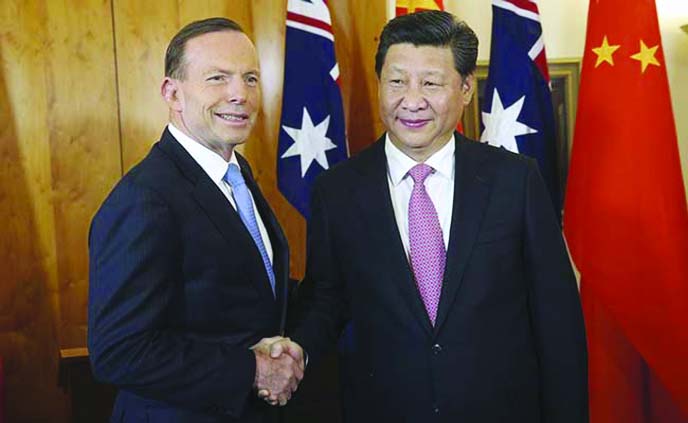
AFP, Beijing :
Beijing and Canberra have agreed to enhance military ties, Chinese state media reported, lauding defence relations between them even as Australia strengthens cooperation with the United States and Japan.
The move follows Chinese President Xi Jinping’s visit to Australia last month, when they agreed to raise their ties to a “comprehensive strategic partnership” and sealed a free trade accord, the official Xinhua news agency reported on Tuesday.
Improving military relations illustrated “a new high of mutual political trust between our countries”, it quoted Fan Changlong, Vice Chairman of China’s Central Military Commission, as saying.
“Military ties forge an important part of bilateral ties,” he added.
Fan held talks with Mark Binskin, the Head of Australia’s military, and Defence Secretary Dennis Richardson, who were in China for an annual strategic dialogue.
Australia, a long-time defence ally of the United States, has also stepped up military ties with Japan and has occasionally tussled with China despite their close trade relations.
In July, Australian Foreign Minister Julie Bishop was quoted as saying that “China doesn’t respect weakness” and that Canberra must “hope for the best and manage for the worst” in its relations with Beijing, prompting the ire of Chinese state media.
Bishop received a rare diplomatic dressing down from Chinese Foreign Minister Wang Yi when she visited Beijing in December last year after Canberra criticised China’s declaration of an air defence zone in the East China Sea.
Last month, Australian Prime Minister Tony Abbott, US President Barack Obama and Japanese Prime Minister Shinzo Abe said they were committed to deepening their already strong security cooperation in the Asia-Pacific.
Meeting on the sidelines of the G20 Summit in Brisbane, they announced enhanced defence cooperation, including trilateral exercises, maritime security capacity building and maritime domain awareness.
Beijing and Canberra have agreed to enhance military ties, Chinese state media reported, lauding defence relations between them even as Australia strengthens cooperation with the United States and Japan.
The move follows Chinese President Xi Jinping’s visit to Australia last month, when they agreed to raise their ties to a “comprehensive strategic partnership” and sealed a free trade accord, the official Xinhua news agency reported on Tuesday.
Improving military relations illustrated “a new high of mutual political trust between our countries”, it quoted Fan Changlong, Vice Chairman of China’s Central Military Commission, as saying.
“Military ties forge an important part of bilateral ties,” he added.
Fan held talks with Mark Binskin, the Head of Australia’s military, and Defence Secretary Dennis Richardson, who were in China for an annual strategic dialogue.
Australia, a long-time defence ally of the United States, has also stepped up military ties with Japan and has occasionally tussled with China despite their close trade relations.
In July, Australian Foreign Minister Julie Bishop was quoted as saying that “China doesn’t respect weakness” and that Canberra must “hope for the best and manage for the worst” in its relations with Beijing, prompting the ire of Chinese state media.
Bishop received a rare diplomatic dressing down from Chinese Foreign Minister Wang Yi when she visited Beijing in December last year after Canberra criticised China’s declaration of an air defence zone in the East China Sea.
Last month, Australian Prime Minister Tony Abbott, US President Barack Obama and Japanese Prime Minister Shinzo Abe said they were committed to deepening their already strong security cooperation in the Asia-Pacific.
Meeting on the sidelines of the G20 Summit in Brisbane, they announced enhanced defence cooperation, including trilateral exercises, maritime security capacity building and maritime domain awareness.

